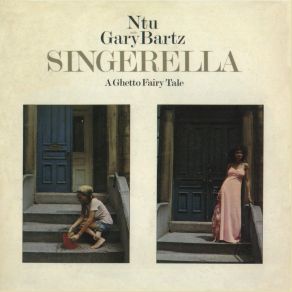Singerella: A Ghetto Fairy Tale
Download links and information about Singerella: A Ghetto Fairy Tale by Gary Bartz. This album was released in 1974 and it belongs to Jazz genres. It contains 8 tracks with total duration of 39:37 minutes.

|
|
|---|---|
| Artist: | Gary Bartz |
| Release date: | 1974 |
| Genre: | Jazz |
| Tracks: | 8 |
| Duration: | 39:37 |
| Buy it NOW at: | |
| Buy on iTunes $9.99 | |
| Buy on Amazon $9.49 | |
Tracks
[Edit]| No. | Title | Length |
|---|---|---|
| 1. | St. Felix Street | 4:58 |
| 2. | Dozens (The Sounding Song) | 4:37 |
| 3. | I Don't Care | 6:44 |
| 4. | Blind Man | 3:01 |
| 5. | Singerella (A Ghetto Fairy Tale) | 6:25 |
| 6. | Lady Love | 6:15 |
| 7. | Mellow Yellow | 4:12 |
| 8. | Nation Time | 3:25 |
Details
[Edit]Released in 1974, Singerella: A Ghetto Fairy Tale by Gary Bartz and his evolving Ntu Troop was a self-produced affair, and the first without vocalist Andy Bey. Bartz was exploring a CTI smooth groove aesthetic by this time, and was deeply invested in the funky side of jazz. He took a hard turn toward jazz-funk's smoother soul side here, an approach that was cemented in the final mix by Larry Mizell, who, along with his brother Fonce, would become his producers for the remainder of the 1970s. Bartz also changed his composition style for Singerella; these are, in large part, shorter, tighter, and feature quirky if readily accessible melodies. Some of these tracks yield fine improvisational moves despite their heavy reliance on funk vamps. This is true in particular of the opener, "St. Felix Street," and the bookend closer, "Nation Time." Other tracks, such as the humorous "The Dozens Song," the driving "I Don't Care" (with a generous touch of the lyric influence and hipster vocal phrasing of Ben Sidran), and "Mellow Yellow" (not the Donovan tune), offer a street-conscious aspect of the band's performance, while keeping the production on the slick side, featuring the infectious Fender Rhodes and keyboards laid down by Hubert Eaves, the razor-sharp guitar work of Hector Centeno, the cracking breaks of drummer Howard King, the tough in-the-pocket hand percussion of Kenneth Nash, and the punched-up accents of bassists James Benjamin and Maynard Parker. Bartz chose to handle the vocals on this set, and his off-key vocals did hurt him on both the title cut and "Lady Love" (these would have been stone killers sung by Bey or any more skilled singer), because their subtleties demand a more accurate pitch. That said, the music more than compensates, and Bartz's own alto, soprano, and clarinet chops are in top shape. This is a curious record, an experiment (and partnership with Mizell) that would take shape further on 1975's The Shadow Do! and culminate in the excellent Music Is My Sanctuary in 1977.